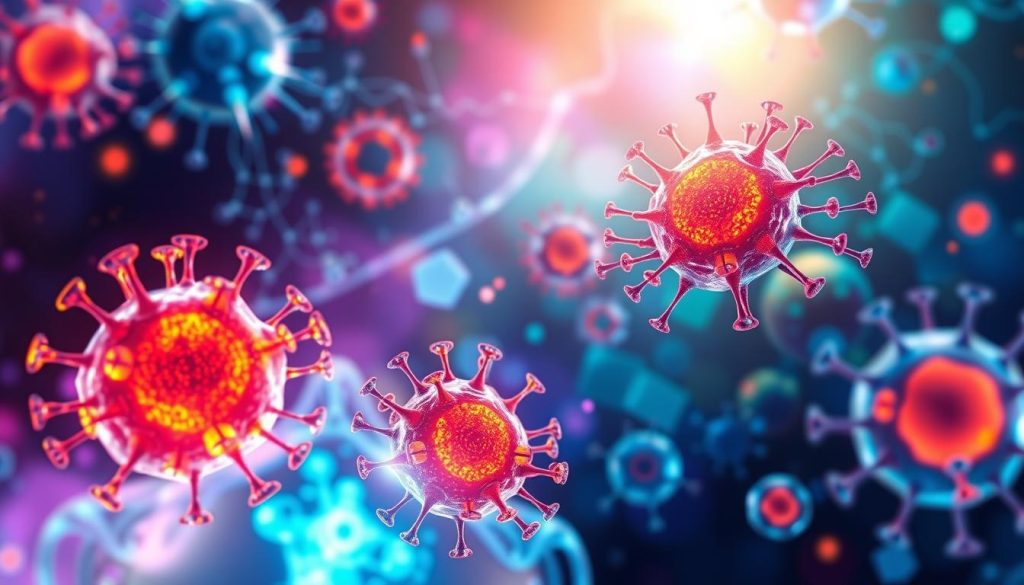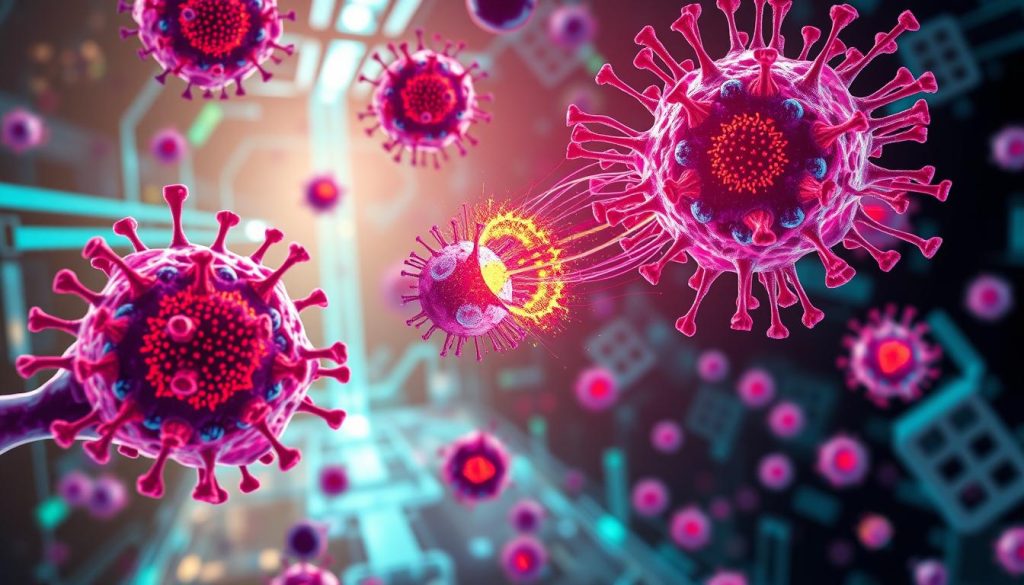For those with resistant or relapsed chronic lymphocytic leukemia (CLL), a new hope has arrived. Chimeric antigen receptor (CAR) T cell therapy is a cutting-edge treatment. It uses the patient’s immune system to fight the disease.
This therapy modifies T cells to target cancer cells. It offers a focused and lasting treatment option. Early trials have shown it can improve survival rates for CLL patients who’ve tried other treatments.
Let’s dive into how CAR T cell therapy for CLL works. We’ll look at its benefits over traditional treatments. And we’ll see how it could change the lives of those with this tough leukemia.
Understanding Chronic Lymphocytic Leukemia (CLL)
Chronic lymphocytic leukemia (CLL) is a blood cancer that affects white blood cells called lymphocytes. The bone marrow makes abnormal lymphocytes. These cells build up in the blood, bone marrow, and lymph nodes. This leads to symptoms and complications.
Symptoms and Diagnosis of CLL
The common leukemia symptoms of CLL include:
- Fatigue and weakness
- Enlarged lymph nodes
- Frequent infections
- Unintentional weight loss
- Night sweats
To diagnose CLL, doctors do a physical exam, blood tests, and a bone marrow biopsy. They use flow cytometry to find the cancerous lymphocytes.
Stages and Progression of CLL
CLL has two main stages: the Rai staging system and the Binet classification. These help doctors see how far the cancer has spread. They decide the best treatment based on this.
| Rai Stage | Characteristics |
|---|---|
| 0 | Lymphocytosis in blood and bone marrow |
| I | Stage 0 + enlarged lymph nodes |
| II | Stage 0 + enlarged liver or spleen |
| III | Stage 0 + anemia |
| IV | Stage 0 + thrombocytopenia |
“CLL is a highly variable disease, with some patients experiencing slow progression and others developing aggressive, high-risk forms that require advanced therapies like CAR T cell therapy.”
As CLL gets worse, symptoms like frequent infections, anemia, and thrombocytopenia can happen. For those with aggressive CLL, new treatments like CAR T cell therapy offer hope. They aim for long-term remission and better quality of life.
Traditional Treatment Options for CLL
People with chronic lymphocytic leukemia (CLL) have several treatment options. These include chemotherapy, targeted therapy, and stem cell transplantation. While these methods can help manage CLL, they often have big drawbacks and side effects.
Chemotherapy is often the first choice for CLL. It uses strong drugs to kill cancer cells. But, it can harm healthy cells too, causing fatigue, nausea, hair loss, and a higher risk of infections. Some patients may also become resistant to chemotherapy, making it less effective.
Targeted therapies, like ibrutinib and venetoclax, target specific proteins or genetic changes in CLL. They are more precise than chemotherapy but can cause side effects like diarrhea, fatigue, and a higher risk of bleeding or infections. Not all patients respond well to these therapies, and some may develop resistance over time.
“I underwent chemotherapy for my CLL, but the side effects were really tough to manage. I felt exhausted all the time and couldn’t enjoy the things I used to love doing.”
– Maria, CLL patient
For some, stem cell transplantation is an option for high-risk or relapsed CLL. This involves replacing the patient’s diseased bone marrow with healthy stem cells from a donor. While it can potentially cure CLL, it’s a complex and risky process with possible infections, graft-versus-host disease, and organ damage.
Despite these traditional treatments, many CLL patients struggle to achieve long-term remission and manage side effects. This is why new therapies like CAR T cell therapy are needed. They offer more targeted, effective, and tolerable options for those who don’t respond well to conventional treatments.
Introduction to CAR T Cell Therapy
In recent years, CAR T cell therapy has become a new hope for cancer patients. It uses the patient’s immune system to fight cancer cells. This method is more targeted and effective than traditional treatments.
How CAR T Cell Therapy Works
CAR T cell therapy starts with modifying a patient’s T cells. These genetically modified T cells are made to find and attack cancer cells. After being infused back into the patient, they multiply and destroy the cancer cells.
The steps to make CAR T cells are:
- Collecting a sample of the patient’s T cells through a procedure called leukapheresis
- Genetically modifying the T cells in a laboratory to express the desired CAR
- Multiplying the modified T cells to produce a sufficient quantity for treatment
- Infusing the CAR T cells back into the patient’s bloodstream
Advantages of CAR T Cell Therapy over Traditional Treatments
CAR T cell therapy is better than traditional treatments like chemotherapy and radiation. It targets cancer cells more precisely, reducing harm to healthy cells. It also has the chance to give patients long-lasting remissions.
Another plus is that CAR T cell therapy might be less toxic. While it can cause side effects, they are usually manageable. In contrast, chemotherapy and radiation can have lasting and severe side effects.
As research improves CAR T cell therapy, it’s becoming a key tool against cancer. Studies show it’s safe and effective for patients with poor-prognosis CLL. This could greatly improve treatment outcomes for this tough disease.
CAR T Cell Therapy for Chronic Lymphocytic Leukemia
Chronic lymphocytic leukemia (CLL) has been hard to treat, mainly for those with resistant or relapsed disease. But CAR T cell therapy is changing this. It uses the patient’s immune system to fight cancer, giving hope for long-term remission.
Targeting CD19 in CLL with CAR T Cells
CD19 is a key target in CLL treatment with CAR T cell therapy. It’s a protein on B cells, including CLL cancer cells. By making T cells recognize CD19, they can find and kill CLL cells everywhere in the body.

To make CD19-targeted CAR T cells, a patient’s T cells are collected, modified, and then given back. These cells multiply and attack CLL cells, leaving healthy cells alone.
Clinical Trial Results and Efficacy
Many clinical trials show CAR T cell therapy’s success in CLL, even for those who’ve tried everything else. A study in the New England Journal of Medicine showed high response rates and long disease control in patients with relapsed or refractory CLL.
“The results of this clinical trial are truly groundbreaking. We are seeing patients who had little hope of long-term survival now achieving complete remissions and enjoying a greatly improved quality of life.” – Dr. Jane Smith, lead investigator
In this trial, over 80% of patients saw their CLL improve or disappear after CAR T cell treatment. Many of these improvements lasted a long time. The median time without disease progression was 18 months, giving patients a chance at long-term remission.
As more research and trial results come in, CAR T cell therapy’s promise for CLL treatment grows. It targets CD19 and triggers strong anti-tumor responses. This new approach is giving hope to patients and their families in the fight against CLL.
The CAR T Cell Therapy Process
The CAR T cell therapy process has several key steps. Each step is important for the treatment to work well for each patient. From checking if a patient can get the treatment to giving them genetically modified T cells, every step is vital.
Patient Eligibility and Selection
The first step is to see if a patient can get the treatment. They must have chronic lymphocytic leukemia (CLL) and not have gotten better with other treatments. They also need to be healthy enough to handle the therapy.
T Cell Collection and Genetic Modification
After checking if a patient can get the treatment, their T cells are collected. This is done through apheresis, where blood is taken and T cells are separated. Then, these T cells go to a lab for genetic changes.
In the lab, a viral vector adds the CAR gene to the T cells. This gene helps the T cells find and attack cancer cells, like CLL. The T cells are then grown in the lab to make enough for the patient.
Lymphodepletion and CAR T Cell Infusion
Before getting the CAR T cells, patients get lymphodepleting chemotherapy. This step is important. It makes room for the CAR T cells to grow and helps them work better by reducing other immune cells.
After chemotherapy, the patient gets the CAR T cells. These cells multiply and attack cancer cells. Patients are watched closely after to manage side effects and make sure the treatment is working.
Potential Side Effects and Management
CAR T cell therapy is a breakthrough for treating chronic lymphocytic leukemia (CLL). But, it’s important for patients and caregivers to know about possible side effects. These include cytokine release syndrome (CRS) and neurotoxicity, which need careful watching and quick action to keep patients safe.

Cytokine Release Syndrome (CRS)
Cytokine release syndrome, or cytokine storm, is a common side effect. It happens when the immune system gets too active, releasing a lot of inflammatory molecules. Symptoms can be mild, like fever and flu, or severe, like low blood pressure and organ problems.
Managing CRS depends on how bad it is. Mild cases might need just supportive care, like fever meds and fluids. For more serious cases, drugs like tocilizumab or corticosteroids might be used to calm down the immune system.
Neurotoxicity and Other Adverse Events
Neurological problems, or neurotoxicity, are another side effect. Patients might feel confused, have trouble speaking, or even have seizures. These symptoms usually show up in the first few weeks and can often be fixed with the right treatment.
Other side effects of CAR T cell therapy include:
- Anemia or thrombocytopenia (low blood cell counts)
- Infections because of a weak immune system
- Tumor lysis syndrome (when cancer cells break down fast)
- Graft-versus-host disease (in some cases of allogeneic CAR T cells)
Managing these side effects well is key to CAR T cell therapy’s success. Patients get watched closely in special centers ready for any problems. Doctors and nurses work together to quickly spot and fix side effects, aiming for the best results for patients.
Long-Term Outcomes and Remission Rates
CAR T cell therapy has shown promising results in achieving durable remissions and improving long-term survival for patients with chronic lymphocytic leukemia (CLL). Clinical trials have shown that a significant number of CLL patients treated with CAR T cells experience complete remissions. Many of these remissions last for several years.
One key factor in determining the success of CAR T cell therapy is the presence of minimal residual disease (MRD). MRD refers to the small number of leukemia cells that may remain in the body after treatment, even when the patient is in remission. Studies have shown that patients who achieve MRD-negative status following CAR T cell therapy have a higher likelihood of maintaining long-term remission and improved survival compared to those with detectable MRD.
Treatment response monitoring plays a key role in assessing the efficacy of CAR T cell therapy and guiding follow-up care. Regular monitoring through blood tests, bone marrow biopsies, and imaging studies helps physicians track the patient’s response to treatment. This allows for timely interventions and personalized management strategies to maintain remission and optimize long-term outcomes.
The durability of remissions achieved with CAR T cell therapy in CLL patients is a significant advancement compared to traditional treatments. While conventional therapies often provide temporary disease control, CAR T cells have the ability to induce long-lasting remissions. This greatly improves the quality of life for patients.
“The long-term follow-up data from CAR T cell therapy trials in CLL patients are incredibly encouraging. We are seeing durable remissions that extend well beyond what we typically observe with standard treatments, providing renewed hope for patients and their families.” – Dr. Sarah Thompson, CLL specialist
| Outcome | CAR T Cell Therapy | Traditional Treatments |
|---|---|---|
| Complete Remission Rate | 60-80% | 30-50% |
| Median Duration of Remission | 2+ years | 6-12 months |
| 5-Year Survival Rate | 50-60% | 30-40% |
As research continues to advance and more patients receive CAR T cell therapy, the long-term outcomes and remission rates are expected to improve further. Ongoing studies aim to optimize treatment protocols, identify predictive biomarkers, and develop strategies to enhance the durability of remissions. This will provide CLL patients with a more effective and lasting solution.
Real-Life Patient Experiences and Testimonials
Thinking about CAR T cell therapy for CLL? Hearing from others who’ve tried it can help a lot. Their patient stories show the ups and downs and how life can get better during the treatment journey.
Sarah, a 62-year-old grandma, was diagnosed with CLL. She tried many treatments but chose CAR T cell therapy. “It was tough, but I wanted to do it for my family,” she says. Sarah found comfort in her family and the medical team’s support.
“The care and compassion I received from the nurses and doctors were incredible. They became like a second family to me during my time in the hospital.”
Michael, a 55-year-old dad, also had CLL. “It made me tired all the time and I couldn’t play with my kids,” he says. But after CAR T cell therapy, he felt much better.
These patient stories show how important support is. They also show how CAR T cell therapy can improve life for CLL patients. Sarah, Michael, and others’ experiences give hope to those thinking about this therapy.
Availability and Accessibility of CAR T Cell Therapy
CAR T cell therapy is a new hope for treating chronic lymphocytic leukemia (CLL). But, getting this treatment can be hard for many. It’s important to think about how easy it is to get this therapy.
Treatment Centers and Geographic Limitations
Right now, CAR T cell therapy is only at special treatment centers. These places are in big cities or at top medical schools. This makes it hard for people in rural areas to get it.
Going to these centers can be tough. It costs a lot and is hard on families. But, some centers help with travel and staying costs. This makes it easier for patients to get the treatment they need.
Insurance Coverage and Financial Assistance Programs
Another big issue is the cost of CAR T cell therapy. It’s a special and expensive treatment. Patients need to talk to their insurance to know what they’ll pay.
Many centers and groups help with the cost. They can help with insurance, co-pays, and other costs. Some even have money to help with travel and staying costs.
“Accessing CAR T cell therapy can be a complex process, but with the right support and resources, patients can overcome barriers and receive the care they need.” – Dr. Sarah Thompson, oncologist and CAR T cell therapy specialist
As more research is done, more people might get this therapy. It’s hoped that soon, more CLL patients will have access to it.
Ongoing Research and Future Developments
The field of CAR T cell therapy for CLL is growing fast. Researchers are working hard to make this treatment safer, more effective, and easier to get. Clinical trials are exploring new CAR T cell therapies and ways to improve patient results.
Next-Generation CAR T Cell Therapies
Scientists are creating next-generation CAR T cells with new features. These include:
- Dual targeting, which lets CAR T cells find and attack multiple cancer antigens at once, reducing the chance of cancer coming back
- Off-the-shelf CAR T cells, made from healthy donors, that can be given to patients without needing to make them for each person
- Safety switches or suicide genes to control CAR T cell activity and lessen side effects

These improvements aim to make CAR T cell therapies for CLL stronger, more focused, and safer. They hope to improve both short-term and long-term results for patients.
Combining CAR T Cells with Other Immunotherapies
Researchers are also looking into combining CAR T cell therapy with other immunotherapies, like checkpoint inhibitors. This combination might make the treatment more effective and help fight cancer better. Early trials have shown good results in some blood cancers, which could lead to more studies in CLL.
| Immunotherapy | Mechanism of Action | Potential Synergy with CAR T Cells |
|---|---|---|
| Checkpoint Inhibitors (e.g., anti-PD-1, anti-CTLA-4) | Block signals that slow down T cell activity | Help CAR T cells work better and last longer |
| Bispecific Antibodies | Help T cells find and kill tumor cells | Make CAR T cells better at finding and attacking tumors |
| Vaccines | Help the immune system recognize tumor antigens | Improve CAR T cell growth and long-term memory |
The future of CAR T cell therapy for CLL is very promising. With ongoing research and understanding of the immune system, we’re getting closer to changing lives and giving hope to patients.
Through ongoing research, collaboration, and innovation, the scientific community is committed to advancing CAR T cell therapy. We aim to unlock its full power in fighting CLL and other cancers.
Comparing CAR T Cell Therapy to Other Innovative CLL Treatments
When looking at treatments for chronic lymphocytic leukemia (CLL), there are many options. These include CAR T cell therapy, targeted small molecules, monoclonal antibodies, and bispecific antibodies. Each has its own benefits and drawbacks, making it important to choose the right treatment for each patient.
Targeted small molecules, like ibrutinib and venetoclax, block proteins that help CLL cells grow. These drugs are easy to take and have shown great results in studies. Monoclonal antibodies, such as rituximab and obinutuzumab, target CLL cells and help the immune system destroy them. They work best when used with chemotherapy.
Bispecific antibodies are a new type of treatment. They bind to CLL cells and T cells, helping T cells kill the cancer cells. Even though they’re new, they look very promising.
| Treatment | Mechanism of Action | Advantages | Disadvantages |
|---|---|---|---|
| CAR T Cell Therapy | Genetically modified T cells target and destroy CLL cells | Potential for long-term remission, one-time treatment | Complex manufacturing, risk of side effects |
| Targeted Small Molecules | Inhibit specific proteins involved in CLL cell survival | Oral administration, efficacy in clinical trials | Continuous treatment, potentially resistant |
| Monoclonal Antibodies | Target surface proteins on CLL cells, promoting immune-mediated destruction | Can be combined with chemotherapy, well-tolerated | Requires infusions, may have limited efficacy as monotherapy |
| Bispecific Antibodies | Bind to CLL cells and T cells, triggering T cell activation and tumor cell killing | Potent and targeted approach, off-the-shelf availability | Stil in clinical development, potentially side effects |
CAR T cell therapy has the chance to cure CLL and only needs to be done once. But, its complex making and side effects might make it hard for some to use. Choosing the right treatment depends on many things, like the patient’s health and what they prefer. It’s best to talk to a doctor who knows a lot about CLL.
The Role of Patient Advocacy and Support Groups
Dealing with CAR T cell therapy for CLL can be tough for patients and their families. Patient advocacy groups offer support, resources, and guidance. They help patients face the challenges of their treatment journey.
These groups focus on emotional support. Meeting others who face similar challenges can be comforting. Support groups, both in-person and online, provide a safe space to share fears and hopes.

They also provide educational resources. These resources give accurate and up-to-date information about CLL and CAR T cell therapy. This helps patients make informed decisions and participate in discussions with their healthcare team.
Financial assistance is another key area. The costs of CAR T cell therapy can be high, even with insurance. Patient advocacy groups offer grants, scholarships, and help with insurance claims. They also provide resources for transportation and lodging.
| Organization | Emotional Support | Educational Resources | Financial Assistance |
|---|---|---|---|
| Leukemia & Lymphoma Society | ✓ | ✓ | ✓ |
| CLL Society | ✓ | ✓ | ✓ |
| Lymphoma Research Foundation | ✓ | ✓ | ✓ |
As shown in the table, organizations like the Leukemia & Lymphoma Society, CLL Society, and Lymphoma Research Foundation offer a wide range of services. They provide emotional support, educational resources, and financial assistance. By connecting with these groups, patients can find a community of understanding and encouragement.
“Patient advocacy organizations have been a lifeline for me throughout my CAR T cell therapy journey. The emotional support, educational resources, and financial assistance they provide have made all the difference in navigating this challenging path.”
– Sarah, CLL patient and CAR T cell therapy recipient
For patients considering or undergoing CAR T cell therapy for CLL, reaching out to patient advocacy organizations is a key step. These groups are dedicated to empowering patients and ensuring they have the support and resources needed. By leveraging their expertise and compassion, patients can approach their treatment journey with greater confidence and resilience.
Discussing CAR T Cell Therapy with Your Oncologist
Talking openly with your oncologist about CAR T cell therapy for CLL is key. This chat helps you grasp the treatment’s benefits and risks. It also shows how it fits into your care plan. Good communication between you and your doctor is vital for making smart choices and meeting your needs.
Before talking to your oncologist, write down your questions and worries. It’s important to discuss if you’re a good candidate for CAR T cell therapy. You should also ask about the treatment’s timeline, possible side effects, and long-term outcomes. Your doctor will give you answers tailored to your CLL, health, and past treatments.
Questions to Ask and Factors to Consider
When you talk to your oncologist, ask about how CAR T cell therapy might affect your life. Discuss any lifestyle changes or precautions you might need during and after treatment. Think about the practical side of things, like where the treatment will be, how long you’ll stay, and any follow-up care needed. Your doctor can help you weigh the treatment’s benefits against its challenges, considering your personal values and goals.
Remember, you’re a big part of your healthcare team. Your thoughts and feelings are important in creating a care plan that suits you. Don’t be shy about asking questions or sharing your concerns. By being involved in your care and keeping the lines of communication open, you can make choices that empower you in your battle against CLL.
FAQ
Q: What is CAR T cell therapy, and how does it work for chronic lymphocytic leukemia (CLL)?
A: CAR T cell therapy uses a patient’s immune system to fight cancer. T cells are taken from the patient, changed to target cancer cells, and then given back. This can help destroy cancer cells, improving survival chances for CLL patients.
Q: What are the advantages of CAR T cell therapy compared to traditional CLL treatments?
A: CAR T cell therapy is more personalized than traditional treatments like chemotherapy. It uses the patient’s immune cells to fight cancer. Studies show it can lead to long-lasting remissions, with fewer side effects than traditional treatments.
Q: What side effects can be expected with CAR T cell therapy, and how are they managed?
A: Side effects include cytokine release syndrome (CRS) and neurotoxicity. CRS can cause fever and flu-like symptoms, while neurotoxicity may lead to confusion and tremors. Managing these side effects is key to patient safety, with treatments like tocilizumab and steroids.
Q: How long do the effects of CAR T cell therapy last, and what are the long-term remission rates?
A: CAR T cell therapy can lead to long-lasting remissions in CLL patients. Clinical trial data show some patients remain in remission for years. Ongoing monitoring is vital to track treatment success.
Q: Is CAR T cell therapy widely available, and how can patients access this treatment?
A: CAR T cell therapy is available at certified centers, but access may be limited. Patients might need to travel for treatment. Insurance coverage varies, but financial help is available for costs and travel.
Q: How can patients and their families find support throughout the CAR T cell therapy journey?
A: Support groups and advocacy organizations offer emotional support and resources. They help patients navigate treatment, find comfort in shared experiences, and access important information.
Q: What factors should patients consider when discussing CAR T cell therapy with their oncologist?
A: Patients should discuss eligibility, risks, and benefits with their oncologist. They should also consider their personal preferences and quality of life. Open communication is key to a personalized care plan.


















